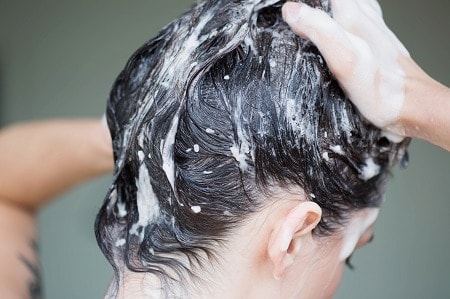There is a very famous saying, “All that glitters is not gold“, and it perfectly fits with the various hair care shampoos available on the market.
Haircare shampoos are one of the most common and most used hair care products.
But, do you know the ingredients of your hair shampoo? Do you know if Sodium Lauryl Sulfate Causes Hair Loss?
Yes, your shampoo can cause hair fall- If it uses Sodium Lauryl Sulfate as a lathering agent.
To know more about the role of Sodium Lauryl Sulfate in shampoo and how can you reduce hair loss due to SLS, read this article till the last.
In this article, “Can Sodium Lauryl Sulfate Cause Hair Loss?,” we will discuss Sodium Lauryl Sulfate in detail to understand what its effect is on our skin and hair.

What is Sodium Lauryl Sulfate?
Sodium Lauryl Sulfate, popularly knows as by its acronym, SLS, is one of the most used Chemical Surfactants.
As per the definition of surfactant available on Wikipedia– “Surfactants are compounds that lower the surface tension between two liquids.”
In shampoo, surfactants are used for the formation of foam and lather.
Sodium Lauryl Sulfate (SLS) is used for cleaning dirt and oil deposits on a surface.
Why Is Sodium Lauryl Sulfate Used In Shampoo?
Almost every shampoo uses a surfactant due to its chemical properties. The surfactant used in Shampoo is a cleaning and lathering agent.
There are Sodium Lauryl Sulfate-Free Shampoos in the market but most shampoos use Sodium Lauryl Sulfate. It is all due to its chemical properties.
Sodium Lauryl Sulfate easily binds dirt and oil present in hair and scalp and then creates lather, due to which it can be easily washed away by water.
Side Effects of Using SLS Shampoos
The regular use of an SLS shampoo can lead to several problems. This is why it is better to use SLS-Free shampoo and conditioner which are safe to use.
- Sodium Lauryl Sulfate causes hair loss.
- Sulfates may clog pores and cause acne.
- It can cause irritation to the eyes.
- It can cause scalp infection.
- One of the reasons behind male pattern baldness
- Causes delay in hair growth.
Why Does Sodium Lauryl Sulfate Cause Hair Loss?
All shampoos use a surfactant to clean dirt and oil from hair. But out of all, surfactant SLS (Sodium Lauryl Sulfate) is the most harsh.
You will be shocked to know a high concentration of SLS is used in industries as engine degreasers and floor cleaners.
According to a report published in the U.S. National Library of Medicine, SLS is closely linked to hair protein damage and hair fall.
The continuous use of SLS not only cleans dirt and oil from the hair and scalp but also removes sebum from the scalp.
Sebum is a natural waxy oil produced by the scalp. It is very necessary for healthy hair and scalp. It keeps our skin moist.
The absence of Sebun causes dry skin, itching, and infection on the scalp. Excessive dryness of the scalp is one of the main reasons behind hair fall.
How to Reduce Hair Fall Caused by SLS Shampoo?
The only way to reduce hair fall caused by an SLS Shampoo is to immediately change your SLS Shampoo and switch to an SLS-Free shampoo and conditioner.
Most shampoos use up to 15% of Sodium lauryl sulfate. The recommended amount of SLS in shampoo that is safe for humans is 1-2%.
A sulfate-free shampoo may produce comparatively less lather or foam, but it is safer than an SLS Shampoo.
As I frequently suggest in my hair care product review, don’t neglect to read the ingredients used in a particular product before buying it.
If you find sulfate in any form, it is better to avoid that particular product to save your hair.
To regain natural hair growth restricted by SLS, you can take Folexin Hair Growth Supplement. It can help you in your hair regrowth and control hair fall simultaneously.
Conclusion
Sodium Lauryl Sulfate is used as a surfactant in most shampoos.
But after knowing its side effects on humans, it is better to avoid any hair care product containing sulfate in any form.
Nowadays, lots of shampoos, conditioners, and other Sodium Lauryl Sulfate-Free hair care products are available. You can use any of them.
Compared to sulfate-based shampoos, sulfate-free shampoos produce less lather and foam, but it does not mean that sulfate-free shampoos are not effective in hair cleaning.
If you find it challenging to select the best SLS Free Shampoo, you can read my previous article in which I have reviewed various SLS-Free Haircare Products.

I’m Natalia, the mind behind HairLossCares.net. I was facing hair fall a few years back. I’m sharing my experience on this blog.
